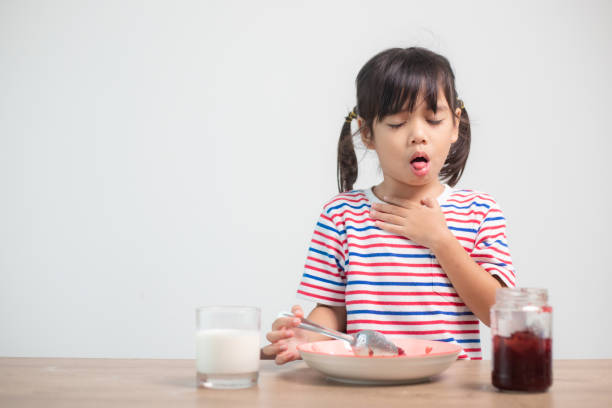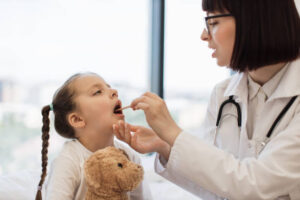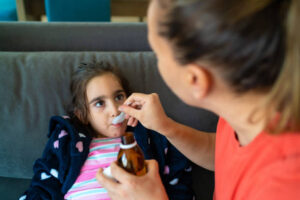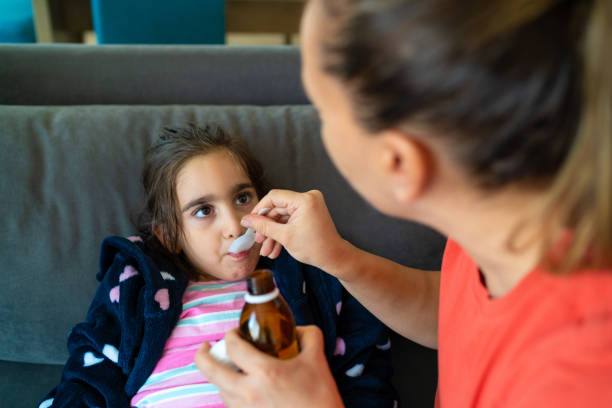Adaptable Children’s Dietary Adjustments for Throat and Chest Issues in 2024
Children’s Dietary Adjustments, Throat and chest issues, Irritating Ingredients, Alternative Food Choices, Philosophy, Scientific Rationale, Potential Side Effects, Minimizing Adverse Effects, Self-Limiting Nature of Many Illnesses, Individualized Treatment Approach, Promoting Holistic Health, Long-Term Benefits, Reducing Antibiotic Resistance, Minimizing Medication Dependency

When a child experiences throat and chest problems, parents often seek medical advice to alleviate their discomfort. In the case of a child with a bad throat and chest, Dr Shaikh, a prominent child specialist, guides Children’s Dietary Adjustments. This article explores the scientific reasoning behind Dr Shaikh’s suggestion to avoid Cerelak and replace it with specific food items. Additionally, it highlights the doctor’s perspective on medication use for children and the importance of reserving it for urgent cases. Dr Shaikh advises parents to stop giving Cerelak, emphasizing that it may not be suitable for every child with throat and chest issues. The rationale behind this recommendation lies in understanding how certain foods can impact throat and chest conditions, particularly when they are irritated or inflamed.
3 Children’s Dietary Adjustments: Scientific Reasoning:
- Irritating Ingredients: Cerelak, like other processed foods, may contain ingredients that can potentially irritate the throat and chest. Some common additives, such as artificial flavours, preservatives, and colourings, can trigger inflammation or allergic reactions in sensitive individuals. By eliminating Cerelak, parents can help reduce the risk of exacerbating the child’s symptoms.
- Alternative Food Choices: To replace Cerelak, Dr Shaikh suggests a range of easily digestible and soothing foods. Each recommended item serves a specific purpose in aiding throat and chest discomfort:
- Curd (Non-Sour): Curd, known for its cooling properties, can provide relief and help soothe the throat. Opting for non-sour curd avoids additional irritation.
- Boiled Potato: Soft and easily digestible, boiled potatoes can provide gentle nourishment without aggravating throat or chest issues.
- Ice Cream: Cold foods like ice cream can help numb the throat, offering temporary relief from discomfort. It is essential to choose non-citrus, non-spicy flavours to avoid further irritation.
- Green Tea: Known for its antioxidant and soothing properties, mild green tea can help reduce inflammation and provide relief.
- Honey: Honey is believed to possess antimicrobial and soothing properties. It can be added to warm water or used as a natural sweetener in other recommended foods.
- Khichdi: Khichdi, a traditional Asian dish made of rice and lentils, is easy to digest, provides essential nutrients, and is gentle on the throat and chest.
4. Medication Use for Children:
Dr Shaikh emphasizes that medication should only be administered to children when necessary, and even then, in appropriate dosages. This approach aligns with the concept of minimizing unnecessary exposure to medication and its potential side effects.
5. The Philosophy:
- Dr Shaikh’s philosophy centres around the principle of avoiding medication for children unless necessary. This approach is based on a combination of scientific research, clinical experience, and a deep concern for the potential risks associated with the overuse of medication.
- Scientific Rationale:
- Assessing Urgent Need: Pediatricians consider various factors, such as the severity of symptoms, the underlying cause of the illness, and the child’s overall health, before prescribing medication. By assessing the urgency of the situation, doctors aim to ensure that medication is administered only when it is deemed essential for the child’s well-being.
- Potential Side Effects: Medications, even those specifically formulated for children, can carry potential side effects. As a precautionary measure, doctors strive to minimize medication use, particularly when alternative measures, such as dietary adjustments, can alleviate symptoms without the need for medication.

father gives a cup of hot tea to his ill son - Minimizing Adverse Effects: Medications, even when prescribed correctly, can carry potential side effects, ranging from mild to severe. Children, in particular, may be more susceptible to adverse reactions due to their developing bodies and immune systems. By minimizing medication use, Dr Shaikh aimed to reduce the potential risks and maximize the child’s overall well-being.
- Self-Limiting Nature of Many Illnesses: Many childhood illnesses and conditions are self-limiting, meaning they resolve on their own over time without specific treatment. Dr. Shaikh’s approach aligned with this understanding, recognizing that the body has remarkable self-healing capabilities. By closely monitoring the child’s condition and providing supportive care, unnecessary medication use could be avoided.
- Individualized Treatment Approach: Dr Shaikh’s emphasis on individualized treatment stemmed from the recognition that each child is unique. Factors such as age, overall health, medical history, and the specific illness or condition at hand need to be considered when determining the appropriate course of action. This personalized approach allowed for a more accurate assessment of the child’s needs, minimizing reliance on medication when alternatives were available.
- Promoting Holistic Health: Dr Shaikh’s philosophy went beyond the avoidance of medication and embraced a holistic approach to child health. By focusing on preventive measures, promoting healthy lifestyle habits, and considering non-pharmacological interventions, he aimed to support the child’s overall well-being, physical development, and emotional health.

Experienced female doctor examining throat of unwell pretty girl using medical tool indoors. Caucasian woman in a lab coat checking the throat of a little patient during a professional domestic visit. - 6. Appreciation and Prayers:
- The genuine appreciation and heartfelt prayers directed towards Dr Sameer Shaikh reflect the deep gratitude felt by parents and caregivers who have witnessed the positive impact of his philosophy. By prioritizing the child’s health and safety above all else, Dr Shaikh not only provided medical care but also instilled confidence and trust in his patients and their families.
- Long-Term Benefits:
- Reducing Antibiotic Resistance: The overuse and misuse of antibiotics contribute significantly to the development of antibiotic resistance, a global health concern. By prescribing antibiotics only when necessary, Dr Shaikh played a crucial role in helping combat this issue and preserving the effectiveness of these essential medications.

A child with a cold is taking medicine. The mother gives the child medicine - Minimizing Medication Dependency: Children who are exposed to excessive medication use may develop a reliance on pharmaceutical interventions. By adopting a more conservative approach, Dr Shaikh aimed to minimize the potential for unnecessary medication dependency and empower children to develop natural resilience and adaptive coping mechanisms.
Administering Medicine to Children Can Be Challenging, but there are Ways to Make it Less Stressful for Both Parents and Kids. Here are Some Tips: Positive Associations:
- Associate medicine time with positive experiences. For example, give the medicine after a favourite activity or as a reward.
- Use a special cup or spoon designated only for medicine to create a positive association.
- Be Calm and Confident:
- Children pick up on their parents’ emotions. Stay calm and confident during medicine administration.
- Explain what you’re doing in a reassuring tone.
- Choose the Right Time:
- Pick a time when your child is relaxed and not too hungry or tired.
- Avoid administering medicine during a tantrum or stressful situation.
- Flavour and Texture:
- Some pharmacies can add flavours (like cherry or bubblegum) to liquid medications. Check if this option is available.
- Cold medicine may taste better for some kids, so refrigerate it before giving it.
- Involve Your Child:
- Let your child have some control. Offer choices (e.g., “Do you want to take your medicine now or in five minutes?”).
- Use a syringe or dropper to let them self-administer (under supervision).
- Distraction Techniques:
- Sing a favourite song, tell a story, or play a game during medicine time.
- Blow bubbles or use a pinwheel to distract from the taste.
- Praise and Rewards:
- Praise your child after taking medicine. Positive reinforcement goes a long way.
- Consider a small reward (like a sticker or a hug) afterwards.
Remember, patience and empathy are key. If your child refuses, don’t force it. Consult your paediatrician for alternative options or strategies
- Conclusion:
- Dr Sameer Shaikh’s philosophy of minimizing medication use for children embodies a thoughtful and compassionate approach to pediatric care. Rooted in scientific reasoning, his philosophy seeks to reduce the potential risks and maximize the child’s well-being by considering alternative interventions, emphasizing individualized treatment, and promoting holistic health. The appreciation and prayers directed towards Dr Shaikh reflect the profound impact he has made in the lives of countless children and their families
Dr Shaikh’s guidance on dietary adjustments for children with throat and chest issues underscores the importance of considering the impact of specific foods on these conditions. By avoiding Cerelak and replacing it with soothing alternatives like non-sour curd, boiled potato, ice cream, green tea, honey, and khichdi, parents can help alleviate discomfort without further irritating the throat and chest.
- Disclaimer: The contents of this article are intended to raise awareness about common health issues and should not be viewed as sound medical advice for your specific condition. You should always consult with a licensed medical practitioner before following any suggestions outlined in this article or adopting any treatment protocol based on the contents of this article.
- If you enjoyed this article, please like and share it with your friends, and don’t forget to Share your personal experience/observations thoughts and valuable suggestions to share for the education /benefit of others. Do subscribe to remain onboard and get more great content!
- https://mrpo.pk/herbs-spices/

